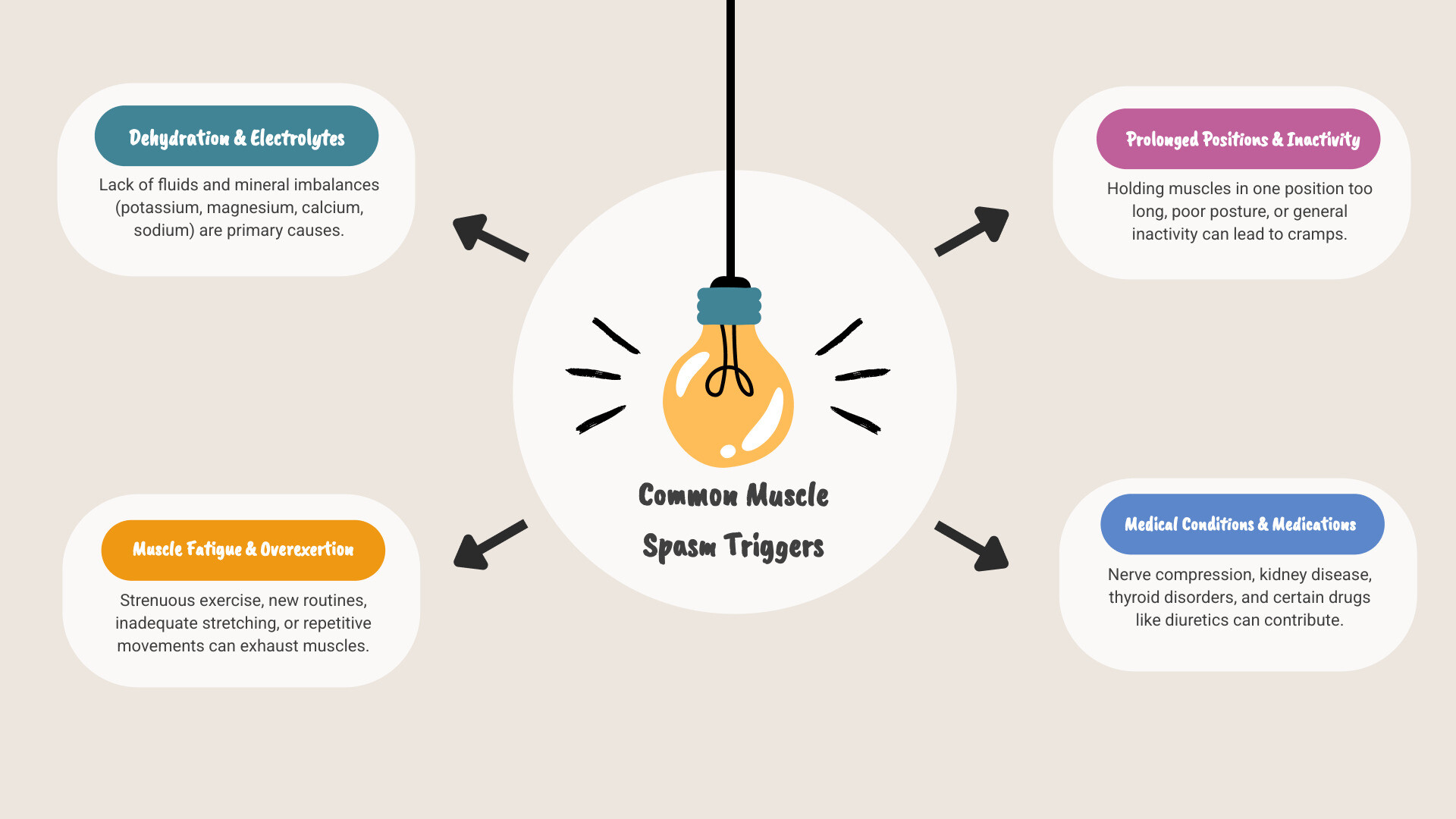Decoding the 'Charley Horse': What Really Happens When Muscles Lock Up
What causes muscle spasms is a question many ask after that sudden, painful tightening in a muscle. A muscle spasm, or "charley horse," is an involuntary muscle contraction where the muscle tightens forcefully and can't relax. Spasms can strike anywhere but most commonly affect the calves, feet, thighs, hands, arms, and back.
Common causes of muscle spasms include:
- Dehydration and electrolyte imbalances (low potassium, magnesium, or calcium)
- Muscle fatigue from overexertion or repetitive movements
- Prolonged immobility or holding one position too long
- Inadequate stretching before activity
- Stress and muscle tension
- Underlying medical conditions like nerve compression or diabetes
- Certain medications, aging, or pregnancy
Most spasms are harmless and resolve on their own, though they can be painful and leave lingering soreness. The muscle may feel rock-hard or show visible twitching. Understanding the root causes is the first step toward lasting relief.
I'm Tony Enrico, and I've helped countless individuals find natural pain relief solutions. This guide will walk you through the science, triggers, and practical solutions to help you move freely again.

Terms related to what causes muscle spasms:
Common Culprits: What Causes Muscle Spasms in Everyday Life?
Whether you're at your desk or in bed, a sudden muscle spasm can be a painful surprise. These everyday occurrences aren't mysterious; they're usually your body's way of signaling that something is off. Maybe you pushed too hard at the gym, forgot to drink water, or sat hunched over your laptop for hours.
Understanding what causes muscle spasms in your daily routine is the first step toward preventing them. The usual suspects include muscle fatigue, dehydration, electrolyte imbalances, or holding an awkward position for too long. For a deeper understanding of how muscles respond to everyday stress, our article on muscle soreness offers valuable insights.

Dehydration and Electrolyte Imbalance
Your muscles require water and electrolytes to function correctly. When these essential elements run low, muscles can misfire, leading to spasms.
Dehydration occurs when your body loses more fluid than you take in, which is common during exercise or on hot days. When we sweat, we lose both water and the minerals our muscles depend on. According to scientific research on muscle cramps, this fluid loss disrupts normal muscle function.
Beyond water, your muscles need specific minerals—electrolytes—to contract and relax properly. An imbalance makes muscles irritable and prone to cramping. The key electrolytes include potassium, magnesium, calcium, and sodium. A mineral deficiency in any of these can set the stage for spasms, especially if you take diuretics or your diet lacks electrolyte-rich foods like bananas, avocados, and leafy greens. The Cleveland Clinic confirms that deficiencies in these minerals significantly increase your risk of cramps. If you're dealing with broader muscle discomfort, understanding muscle pain can provide helpful context.
Muscle Fatigue and Overexertion
Pushing your muscles too hard without adequate rest is a primary trigger for what causes muscle spasms. When you engage in strenuous exercise, your muscles can become exhausted, making them prone to cramping. The Mayo Clinic identifies overworking muscles as one of the most common causes of cramping.
Inadequate stretching before and after activity leaves muscles tight and vulnerable to involuntary contractions. Similarly, poor conditioning means your muscles aren't ready for the demands placed on them, causing them to tire quickly and spasm. Starting new workout routines too aggressively is also a risk, as your muscles need time to adapt. Even repetitive movements at work can fatigue specific muscle groups, leading to spasms.
For those navigating post-exercise discomfort, our guide to post-workout muscle soreness offers practical recovery strategies.
Lifestyle Factors: What causes muscle spasms from diet and exercise?
Your daily habits play a powerful role in muscle health. Poor posture and prolonged sitting hold certain muscles in shortened positions, creating imbalances and tension that can lead to spasms, particularly in the back and neck.
Conversely, inactivity causes muscles to lose strength and elasticity, making them more likely to cramp when you do use them. Your mental state also matters; stress and anxiety keep muscles in a state of sustained tension, which can manifest as twitches and spasms.
What you consume is also a factor. Excessive caffeine intake can overstimulate the nervous system and trigger muscle twitches. Finally, certain medications, especially diuretics, can cause spasms by depleting essential electrolytes. If you notice increased spasms after starting a new medication, discuss it with your doctor.
Small adjustments to your posture, activity level, and stress management can make a significant difference in preventing muscle spasms.
When Spasms Signal Something More: Underlying Medical Conditions
While most muscle spasms are harmless, sometimes they are a sign of a more serious issue. Knowing when a cramp is a warning sign is crucial for getting the care you need.
If your muscle spasms are frequent, cause severe pain, or are accompanied by swelling, redness, muscle weakness, or numbness, it's time to see a doctor. These symptoms are your body's way of waving a red flag.
The Mayo Clinic advises seeing a doctor if cramps cause severe discomfort, happen often, or don't improve with self-care. Ignoring these signs could mean delaying treatment for a manageable condition.
Nerve-Related Issues
When nerves—the body's communication lines—are disrupted, muscles can receive garbled signals, leading them to contract involuntarily.
Nerve compression, or a pinched nerve, is a common culprit. This occurs when surrounding tissues press on a nerve, causing pain, numbness, and muscle spasms. Spinal conditions are often to blame. A herniated disc can bulge out and press on spinal nerves, while spinal stenosis involves a narrowing of the spinal canal that squeezes the spinal cord and nerves.
Neuropathy, or nerve damage, is another cause. When nerves are damaged by injury, infection, or diseases like diabetes, they can send abnormal signals to muscles, causing twitches and spasms. WebMD explains that neuropathy can stem from various factors, including alcoholism and certain medications. Our article on the ins and outs of neuropathy offers a comprehensive look at this condition.
Systemic and Metabolic Conditions: What causes muscle spasms that are frequent or severe?
When spasms are frequent, the cause might be a whole-body issue affecting your internal systems. These conditions disrupt the chemical balance your muscles need.
Kidney disease can throw off electrolyte balance, leading to muscle cramps as function declines. Thyroid disorders, both overactive and underactive, disrupt metabolism and affect how muscles respond to nerve signals. Peripheral Artery Disease (PAD) involves narrowed arteries that starve muscles of oxygen, causing painful cramps during activity that ease with rest.
Diabetes can trigger spasms through nerve damage (neuropathy), poor circulation, and electrolyte imbalances. During pregnancy, changes in circulation, pressure on nerves, and increased demand for minerals like magnesium and calcium make cramps common. The Mayo Clinic confirms this, particularly in the legs.
If you experience frequent or severe spasms, a healthcare provider can investigate whether an underlying condition is the cause. For more information, the Mayo Clinic's guide is an invaluable resource.
Finding Relief and Preventing Future Spasms
Now that we've explored what causes muscle spasms, let's focus on relief and prevention. The path to spasm-free muscles combines immediate relief strategies with long-term prevention habits, supported by self-care and Neuropasil topical solutions.

Immediate At-Home Treatments
When a muscle spasm hits, you can find relief with simple, immediate interventions.
- Gentle stretching: Your most effective tool. Slowly stretch the affected muscle in the opposite direction of the contraction. Hold the stretch steadily until the muscle releases.
- Massage: Gently but firmly knead the cramped muscle. This, combined with stretching, helps the muscle fibers relax and improves blood flow.
- Heat therapy: For lingering tightness, a warm towel, heating pad, or warm bath can increase circulation and encourage deep muscle relaxation.
- Cold therapy: If the muscle is sore or inflamed after the cramp, an ice pack wrapped in a towel can reduce pain and inflammation. Apply for 15-20 minutes.
For more natural relief methods, our article on effective cures for muscle cramps offers additional solutions.
Long-Term Prevention Strategies
The best muscle spasm is one that never happens. Building healthy habits can stack the odds in your favor.
- Proper hydration: Drink water throughout the day to keep your muscles functioning smoothly, especially if you are active.
- Balanced diet: A diet rich in potassium, magnesium, and calcium provides the minerals muscles need. Focus on leafy greens, nuts, seeds, and bananas.
- Regular exercise: Consistency is key. Gradually build your fitness level to help muscles adapt without becoming overwhelmed.
- Warm-up and cool-down: A proper warm-up prepares muscles for work, while a cool-down with stretching aids recovery and maintains flexibility.
- Ergonomics: If you sit for long periods, use a supportive chair, position your screen at eye level, and take regular stretch breaks.
- Stress management: Chronic stress leads to muscle tension. Practices like meditation, deep breathing, or yoga can help your muscles relax.
For athletes, our guide to tips for workout recovery offers targeted advice to keep muscles in peak condition.
Neuropasil Topical Solutions
When spasms occur despite your best efforts, Neuropasil nerve pain relief cream offers targeted support. Our formula uses a blend of natural ingredients, including Menthol for a cooling sensation, skin-conditioning Aloe Vera, and Urea to help the formula penetrate deeply.
How Neuropasil supports muscle comfort and recovery is by delivering relief exactly where you need it. Unlike oral medications, topical application allows the active ingredients to work directly on the problem area for faster relief. Our customers use Neuropasil for a wide range of discomforts, including cramps, neuropathy, sciatica, and general aches and pains. The cream absorbs quickly without a greasy residue, making it perfect for your gym bag, office, or home.
Our article comparing oral vs. topical relief explains the benefits of this approach. Ready to experience the difference? You can find fast-acting relief now with Neuropasil.
Frequently Asked Questions about Muscle Spasms
We've covered a lot about what causes muscle spasms, but a few questions come up repeatedly. Here are the answers to help you feel more confident in managing them.
What vitamin or mineral deficiency causes muscle cramps?
Regular muscle cramps may indicate your body is low on essential nutrients that help muscles perform smoothly.
- Magnesium deficiency is a common culprit. Magnesium helps muscles relax after contracting. Find it in leafy greens, nuts, and seeds.
- Potassium deficiency can scramble nerve signals to muscles. Bananas, sweet potatoes, and avocados are excellent sources.
- Calcium deficiency is also a factor, as calcium is vital for the muscle contraction process. Look for it in dairy products and leafy greens.
- Vitamin D plays a supporting role by helping your body absorb calcium. A deficiency can indirectly affect your muscles, as noted by the Cleveland Clinic.
A balanced diet is the best way to get these nutrients. If you eat well but still have frequent cramps, ask your doctor about testing for deficiencies.
What does it mean when you get muscle spasms all over your body?
A single cramp is one thing, but widespread spasms can be alarming and warrant attention. While it could be severe dehydration or a major electrolyte imbalance, it can also signal a more serious systemic condition like thyroid or kidney disease.
Certain medication side effects can also trigger generalized spasms, as noted by WebMD. If you experience severe muscle cramps all over your body, especially with symptoms like extreme weakness or confusion, you should seek emergency care. The American Osteopathic Association emphasizes that severe or widespread cramps require medical attention.
What kind of doctor should I see for muscle spasms?
Your primary care physician (PCP) is the best starting point. They can evaluate your symptoms, check for common causes, and refer you to a specialist if needed.
- A neurologist is a specialist for the brain and nerves and can investigate if conditions like neuropathy are what causes muscle spasms.
- An orthopedist deals with structural issues in bones and joints, such as a herniated disc or spinal stenosis.
- A physical therapist can create a personalized program to address muscle imbalances, poor posture, or overuse injuries.
If your spasms are chronic, interfere with daily life, or come with other concerning symptoms, start with your PCP to get guided to the right expert.
References
We've drawn on trusted medical sources to ensure you're getting reliable information about what causes muscle spasms. When it comes to your health, you deserve the best available knowledge.
- American Osteopathic Association: Provides a helpful overview of muscle cramps and their causes. osteopathic.org
- Cleveland Clinic: Offers expert guidance on the connection between mineral deficiencies and muscle function. my.clevelandclinic.org
- Mayo Clinic: A comprehensive guide on when to seek medical attention for muscle cramps and potential underlying conditions. mayoclinic.org
- Medical News Today: Provides perspectives on various risk factors and triggers for muscle spasms. medicalnewstoday.com
- MedlinePlus: A resource from the U.S. National Library of Medicine on the health risks of an inactive lifestyle. medlineplus.gov
- Spine Health Foundation: Offers insights into how spinal conditions can lead to muscle spasms. spine.org
- WebMD: Provides practical information on various causes, including medication side effects and neuropathy. webmd.com
These sources represent respected names in medical information, providing a complete and balanced picture of muscle spasms.















